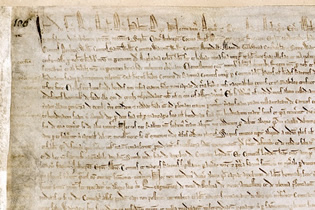2nd February 2016 Tripoli, Libya
Corruption versus Rule of Law

Libya is one of the ten most corrupt countries in the world. So said a report issued by Transparency International last week.
So what? Who cares if the wealth of a country is siphoned off into private hands?
The people should care. Corruption is the enemy of progress: it stifles development, marginalises prosperity, and undermines good governance.
Corruption has a direct impact on the ability of a government to make a difference to people’s lives. Why was the wealth that Libya earned when oil prices were high not invested in modern hospitals, schools and infrastructure? The corruption of the past is evident in the poor or non-existent facilities in many Libyan towns.
Transparency International stated: “Security will only succeed long-term if governments make a break with cronyism and build trust with citizens.”
How? By insisting on transparency and the rule of law. If people know how and why decisions are taken and can hold their political masters to account, they can influence those decisions and ensure that they meet their needs.
In many countries this theme is central to people’s demands for democracy and respect for human rights.
For that reason, the UK launched the Magna Carta Fund. In case you are wondering, the Magna Carta was signed near London 800 years ago. It was forced upon the unpopular King John by a group of rebel barons. It gave them protection against illegal imprisonment and access to swift justice.
The Magna Carta is the bedrock of the future development of rights in England. It has been called the greatest constitutional document of all time, the foundation of the freedom of the individual against arbitrary authority of a despot. In short, it tackled the corruption of power.

Under this fund, we have £400,000 for projects in Libya. We have chosen three main themes.
The first is gender-based violence. This issue came to prominence during the 2011 revolution when a number of Libyan women were raped. Some women had the courage to describe their ordeal. By exposing the perpetrators, they challenged the social stigma attached to the victims of such crimes. We are interested in finding local partners who can change the culture of secrecy and impunity of the perpetrators.
The second theme is judicial reform. There is a breakdown of law and order in Libya and the criminal justice system has collapsed. Judges have been murdered and intimidated. We are interested in projects which restore the justice system and instil the principle of respect for the law.
The third theme is support for people with disabilities. Those born with disabilities can make a major contribution to society. Moreover, there are those who have been injured during the revolution or by stepping on unexploded ordnance left behind from the conflict. We are looking for projects that will help such people live a normal life.
The deadline for outline bids for projects under the fund is 10 February. We hope to have many creative and innovative ideas from partners who can make a difference on the ground.
Some might say that such projects constitute meddling in the internal matters of another country. But human rights are universal, most countries have signed up to a common set of principles which are monitored by the United Nations. All religions share the same values. We can all help each other to promote and respect these rights and values.
An underlying theme behind these questions is dignity: the need for people in any country to have confidence that the power in their country is being wielded fairly and in accordance with an international set of values and rules. Such rules have to apply to the people in power. Because it isn’t power that corrupts people; it is people who corrupt power.
In my view Libya could but I must say would be the worst country in the world when it comes to corruption.. everything is corrupt .. and unjust people are queuing to get loaf of bread queuing to get a bottle of cooking gas.. Yet in fact Libya could be the richest Arab country abandons of wealth from gold to oil God gave this country blessing .. yet the normal people are going through a faze of pain and suffering .. the corrupt politician renewed though resumed their bickering and intrigue once more their capability to deceit the people with a manner never heard before .. at the time of my believed thinking it seemed to offer some prospect of respite .. destruction that is what was taking place ..
what I am trying to say that in Libya everyone feels the need of tranquility peace and justice .. almost all Libyans here realize that we have security problems.. The strong militias counting as hundreds are spreading all over the land and operating in many of these areas like Tripoli .. can I be a a writer?
please reply to my Email
Very well expressed for simple directness and clarity. Thank you to all who want to support Libya on her journey to a shining, independant future within the family of inter-dependent nations. This letter should be shared with as many people as possible. Best wishes to everyone with hope in their hearts and strength of determination. Arise again, Libya!